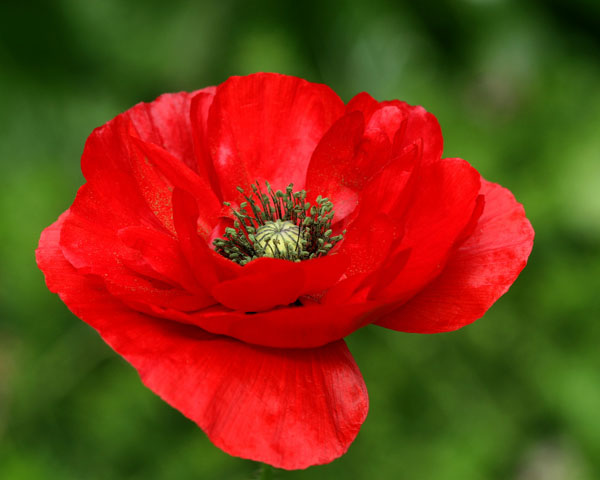October 29, 2019
The Red Flower
 By Mary Schricker Gemberling
By Mary Schricker Gemberling
My earliest memory of Armistice Day came before I could barely pronounce the word. My dad would bring home two small red flowers made of crepe paper to give to my sister and me. He pinned the flowers on our collar and told us to wear them to honor the soldiers who had fought in war. Confused by his reference to war and soldiers, the meaning of the flower was lost on me as a child. But because my birthday was just a few days later in November, I remembered the red flowers for many years to come. In later years I understood the reason for Armistice Day, but never did know the connection between the war and the red flower.

Although it is commonly assumed that the origin of the poppy as a symbol came from the devastation of the First World War, it actually can be traced back to the Napoleonic wars of the early nineteenth century. Anonymous documents noted that following battle, poppies became abundant in fields where soldiers had fallen. In English folk lore, the poppy has long symbolized sleep and death. Sleep because the opium extracted from them is a sedative, and death because of the common blood-red color of the poppy. Poppies used as symbols on tombstones symbolize eternal sleep. In the popular children’s novel The Wonderful Wizard of Oz, a magical poppy field threatened to make the heros sleep forever.
The red-flowered corn poppy, actually a common weed in Europe grows between May and August. The wind scatters its seeds, which can lie dormant in the ground for a long time. If the ground is disturbed in the early spring the seeds may germinate and the poppy flowers will grow. Between 1914 and 1918, World War I took a greater human toll than any previous conflict. Some 8.5 million soldiers died with injuries or disease. In the spring of 1915 the churned up World War I battlefields of France and Belgium and the newly dug graves of fallen soldiers provided the perfect conditions for this “Miracle Flower.”
Among the dead was Lieutenant Alexis Helmer, a friend of John McCrae, a Canadian who served as a brigade surgeon for an Allied artillery unit. Struck by the sight of the bright red blooms on broken ground amid the carnage, McCrae wrote a poem, “In Flanders Field” in which he directed the voices of the fallen soldiers buried under those hardy poppies. Published in Punch magazine in late 1915, the poem would be used at countless memorial ceremonies, and become one of the most famous legacies to emerge from World War I.
Two days before the Armistice agreement was signed on November 11, 1918, an American professor named Moina Michael came across McCrae’s poem while volunteering for the war effort in New York City. She had the idea to wear the poppy as an “emblem of keeping the faith” for all who had died. She bought two dozen small silk red poppies which she gave to her co-workers before making more to sell. At her urging, the National American Legion in 1920 voted to use the poppy as the official U.S. national emblem of remembrance. The popularity of Michael’s tradition quickly outgrew its American roots as it crossed the Atlantic, first taking a firm hold in France, followed by the UK, Canada, Australia and New Zealand. Today, three million artificial poppies are sent annually to people in over 120 different countries across the globe.
In the United States, Armistice Day, now referred to as Veterans Day continues to honor our veterans. November 11, 2019 will mark 101 years since the end of World War I, with a range of tributes and commemorations set to take place across the country. As we continue to live in a world dominated by hostilities it is necessary that we take time to remember the sacrifices of so many and more importantly the values for which they fought. On the 11th month of the 11th day at 11 AM please take time to observe a moment of silence in appreciation of the freedoms gifted you by those who lie beneath the fields of poppies.
“In Flanders Fields” by John McCrae
In Flanders fields the poppies blow
Between the crosses, row on row,
That mark our place; and in the sky
The larks, still bravely singing, fly
Scarce heard amid the guns below.
We are the Dead. Short days ago
We lived, felt dawn, saw sunset glow,
Loved and were loved, and now we lie
In Flanders fields.
Take up our quarrel with the foe:
To you from failing hands we throw
The torch; be yours to hold it high.
If ye break faith with us who die
In Flanders fields.
Mary, a former educator and Seniors Real Estate Specialist, is the author of three books, The West End Kid, Labor of Love; A Personal Journey through the World of Caregiving, and Hotel Blackhawk; A Century of Elegance.


